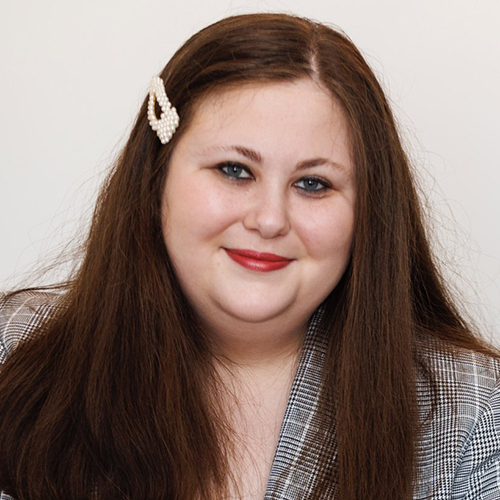This blog post originally appeared at blog.dol.gov.
To acknowledge Mental Health Awareness Month this May, DOL’s Office of Disability Employment Policy sat down with Marissa Ditkowsky, disability economic justice counsel at the nonprofit National Partnership for Women & Families and adjunct professor at American University Washington College of Law (AUWCL). She works on everything from research to policy analysis to advocacy, focusing on advancing policies that support the economic health of disabled women, and particularly, disabled women of color.
Marissa, who lives in Maryland, says her personal and professional experiences propelled her to advocate for, and with, disabled people like herself. Here’s more of what she had to say. (This conversation has been edited for length and clarity.)
Tell us how you decided to pursue law and disability advocacy.
My journey was driven by my personal experiences. I wanted to make things better for others going through similar things – to help folks who maybe don’t know their rights or need help navigating difficult situations. My lived experiences as a disabled woman frames and fuels my perspective and work at the National Partnership.
Would you share more about your disability and the barriers you’ve faced?
I am multiply disabled, meaning I have several types of disabilities. I have a chronic condition called myotonic dystrophy type 2, which affects multiple body systems and causes many different symptoms. The big ones are pain and fatigue.
I also have anxiety. My anxiety primarily impacts communication – both how I communicate and what I need from communication. Not everyone knows or realizes the types of accommodations that can be made for folks with mental health conditions, but expectations and needs from communication are just one example.
My anxiety can sometimes make it difficult to advocate for myself – when I have problems accessing needed accommodations, it exacerbates my anxiety. If we mean it when we say we care about mental health, we must consider people’s experiences requesting accommodations. Sometimes the process itself can impact a person’s mental health, even if the accommodation itself isn’t directly mental-health related.
It sounds like you are speaking from your own experience.
In law school, I needed accommodations to assist with the pain and fatigue in my arms and hands. Some of my requests were initially denied. Although I was ultimately able to record classes, I was initially offered a notetaker instead. And while I appreciated that, it would not have met my specific access needs.
The biggest struggle was with the MPRE [Multistate Professional Responsibility Examination], an exam many states require for admission to the bar. My requests for accommodations were denied, and I didn’t appeal because it was just too time consuming. I am fortunate that it ultimately worked out for me, but it doesn’t for everyone.
How do you feel mental health is perceived in the legal profession?
The culture needs to improve – not just for disabled people, but for everyone. Some clear examples of parts of the legal profession that may impact mental health are concerns about work-life balance or the culture of competition in law school. In legal services, it can be difficult to cope with the secondary trauma and avoid burnout. I’m involved in the National Disabled Legal Professionals Association (NDLPA), and earlier in my career, I was a leader of the National Disabled Law Students Association (NDLSA). Both groups are actively working toward making the legal profession more accessible and inclusive. But it will take a real commitment from law schools, employers, testing administrators, licensing bodies, the bench and others.
What changes would help foster a more inclusive culture in law?
To start, we need to make sure that folks know what resources are available. They can go to the Job Accommodation Network (JAN), or connect with NDLPA to talk to other disabled lawyers with similar experiences. Additionally, we need to stamp out stigma. Ultimately, without marginalized folks in leadership roles or systemic change, we cannot achieve a more inclusive culture.
What changes do you think could be made in law school?
In the disability rights course I teach at AUWCL, I tried to apply the principles of universal design as much as I could. For example, I avoided “cold calling” students to answer questions, for instance. I also recorded my classes and had a flexible attendance policy. I still had high levels of participation and engagement. While accommodations are important, they infer an exception to the norm. I try to focus on having access be the norm. It is possible to make law school and the legal profession more inclusive – we just have to be willing to reimagine it.
Marissa Ditkowsky is a disability economic justice counsel at the nonprofit National Partnership for Women & Families and adjunct professor at American University Washington College of Law (AUWCL)


